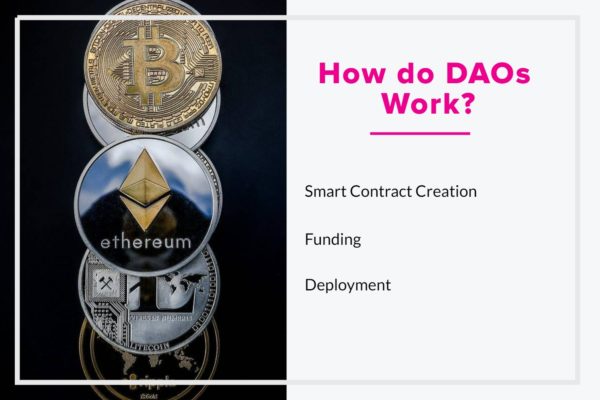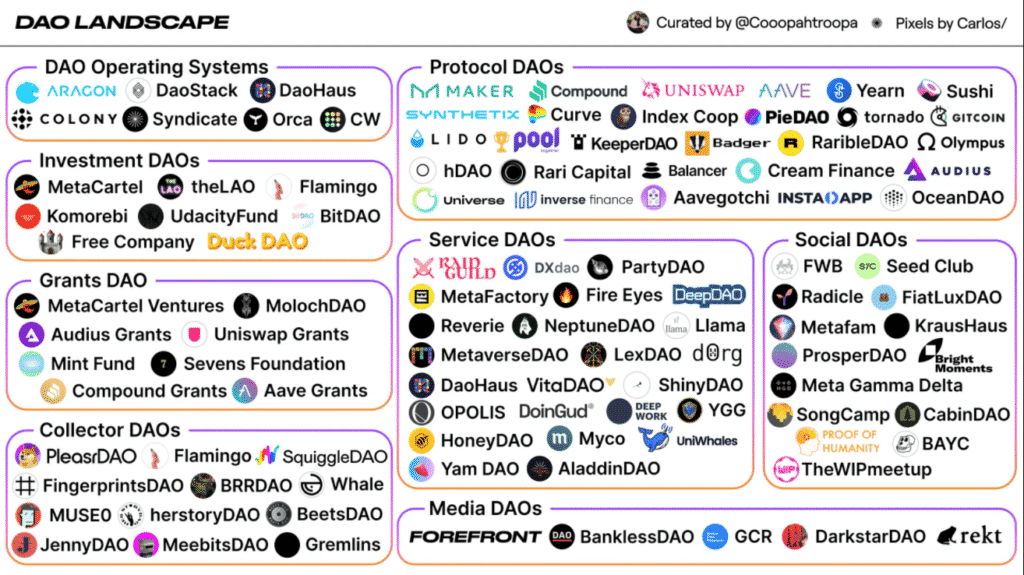In this article, you’ll learn the basics of DAOs, including what they are, how they work, and also some examples of them.
What is a DAO?
DAO, short for Decentralized Autonomous Organization, is a type of organization that uses blockchain technology to eliminate the need for centralized management.

Anyone with an idea can form a DAO to raise funds, build community, and accomplish a common mission.
- A Decentralized Autonomous Organization doesn’t have a traditional hierarchical management structure. It’s designed to work without human interference, meaning it’s decentralized.
- Instead, it’s governed by a code. The code includes agreed-upon rules. Decisions are made autonomously by executing this code.
- DAOs are transparent because they’re built on open-source blockchains. All transactions are recorded on the blockchain, allowing anyone to view and audit the source codes and treasuries.
How do DAOs work?

Any organization can run as a Decentralized Autonomous Organization. Generally speaking, there’re three integral components of a decentralized autonomous organization.
-
Smart contract creation
First, a core team of developers and community members establish a set of rules through smart contracts. A smart contract can be deployed on any blockchain today. However, the most common one is still the Ethereum blockchain.
These contracts set the foundational framework by which the DAO will operate. They self-execute whenever a set of criteria are met.
After the founding team sets the rules via smart contracts, only community members can change them later based on the governance system of the DAO. That’s why initial contracts must be extensively tested before the launch.
-
Funding
After the first step, the Decentralized Autonomous Organization must decide how to receive funding and carry out governance.
For this purpose, the core developer team issues governance tokens representing a share of the organization. These tokens are sold through public or private offerings to raise funds for the DAO’s treasury.
Those who purchase these tokens receive voting rights in exchange for their investments. The voting rights are generally varying in degree; they are usually proportional to the number of token holdings.
Once funding is complete, the next step is deployment.
-
Deployment
From this point on, no central authority, including those who wrote the initial smart contracts, can interfere with or modify the rules of the DAO.
Instead, the community of token holders decides on the future of the DAO. The way it’s done is by reaching a consensus through community voting.
Community members can, for instance, vote on a proposal to decide how the raised funds should be spent in the most beneficial way possible.
- There’re different voting models used in practice. Generally speaking, a proposal can only pass if the majority of the community approves it. But the definition of majority differs from one Decentralized Autonomous Organization to another.
Some DAOs deploy quorum-based voting. For example, 4% of quorum is required to pass a proposal on the decentralized exchange Uniswap.
- In addition, there’re various voting power models. In most cases “one vote per one token” principle is applied.
This approach grants the same voting power to the community members with the same token holdings. On the other hand, some DAOs deploy weighted voting power. They grant more voting power to the community members who lock their tokens for a specified time, for example.
Examples of DAOs

There can be endless reasons for launching DAOs, as there’re endless reasons for building organizations.
- There are, for instance, DAOs built for investment purposes. They raise funds to invest in crypto assets, mainly in NFTs. An example is Flamingo DAO. It’s an NFT-focused organization that explores attractive investment opportunities. Members of Flamingo may have the right to factionalize, borrow, lend, or display the NFTs or use them as collaterals in DeFi applications.
- There’re also DAOs with a social focus. They’re built around shared interests or missions. Friends with Benefits DAO is a social club for creative people rewarding its members with access to special events.
- Protocol DAOs like Uniswap and Compound give the voting power to holders of governance tokens to improve the future of decentralized trade.
- Raid Guild is a service DAO that brings talent together to build a better crypto ecosystem. Professionals can offer their coding, marketing, or designing skills to the DAO’s client base, which consists of other crypto projects and protocols. Service DAOs have the potential to redefine how we work by building a global talent pool for any sector we can imagine.
- Media DAOs are built to produce content collaboratively. Instead of relying on advertising-based revenue models, these organizations distribute tokens to contributing members. BanklessDAO is an example of this. Its purpose is to produce educational content about web3 through its community of contributors. Forefront is another example of this type.
- Then there’re grant DAOs, with Moloch DAO being one of the most well-known ones. Moloch members contribute capital to fund Ethereum infrastructure improvements.
Related:
- How to Make Money with NFTs
- How to Make and Sell an NFT
- Where Do you Store NFTs? How does NFT Storage Work?
- Frequently Asked Questions about NFTs
- Best NFT Creator Software
- Best NFT Displays
- NFT Trends
Frequently Asked Questions
What is a DAO?
A Decentralized Autonomous Organization or DAO is a company or organization that runs based on rules established by an encoded computer program. This helps keep things transparent and non-centralized. This type of organization is not entirely influenced by the central government and is governed by member-owned communities supported by blockchain. Financial transactions for this type of organization are recorded on the blockchain and exist decentralized to traditional organizations.
What is a smart contract?
In blockchain, smart contracts are transaction protocols that ensure that events are carried out automatically when certain criteria are met. In simple terms, they are digital contracts on the blockchain that ensure transactions are carried out as specified or priorly agreed.
Where can I register my DAO?
In the United States, Wyoming has been the first state to establish DAOs as legally binding. Individuals can register their partnership or organization as a DAO via post or online.
How much does forming a DAO cost?
Currently, forming DAOs on the Ethereum blockchain costs around 0.2 Ether.
How much does creating a smart contract cost?
Creating a smart contract on Ethereum blockchain can cost anywhere from $7,000 all the way up to $100,000 depending on the complexity. That said, Proof of Stake (POS) blockchains are considerably cheaper with cryptocurrencies like Cardano (ADA). For reference, these cost only a maximum of 2.17 ADA (less than 2 dollars currently).
What is a DAO? And how does a DAO work?
In summary, a Decentralized Autonomous Organization shifts the power from a select group of individuals to communities thanks to blockchain technology. The members make critical choices about the future of the DAO collectively based on preset rules given by smart contracts. All transactions and voting history are recorded on the blockchain; therefore, details of all proposals are readily available.
DAOs are one of the most exciting advances of our times; they have the power to transform how organizations work and make decisions.
If you’d like to participate in a Decentralized Autonomous Organization, you can search for one that aligns with your talents, skills, and passions and see how they intersect with the project’s missions. Then you can contribute, for example, by writing, researching, analyzing, designing, or marketing.
